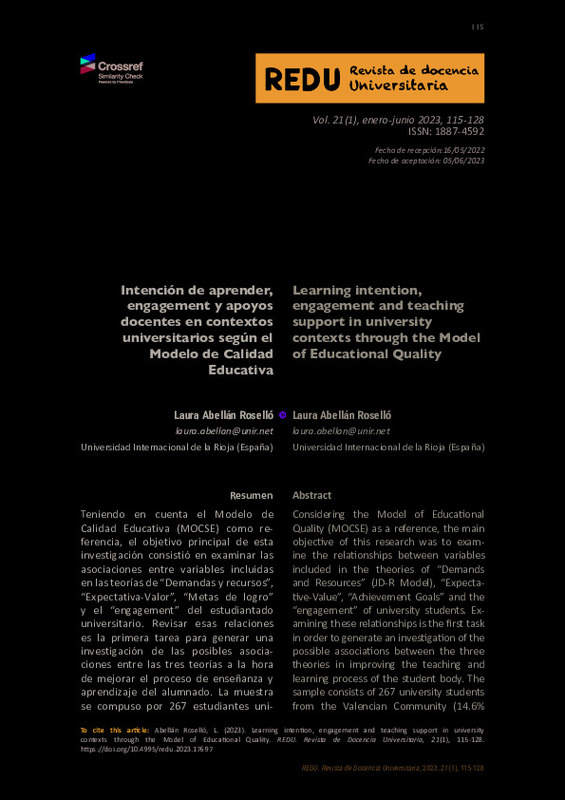Alonso Tapia, J. (2002). Motivación y aprendizaje en el aula. Cómo enseñar a pensar. Santillana. Aula XXI Ames, C. (1992). Classrooms: Goals, structures, and student motivation. Journal of Educational Psychology, 84, 261-271. https://doi.org/10.1037/0022-0663.84.3.261
Andrew, M. & Andrew, E. (2016). The role of personal best (PB) and dichotomous achievement goals in students' academic motivation and engagement: A longitudinal investigation. Educational Psychology, 36(7), 1282-1299. https://doi.org/10.1080/01443410.2015.1093606
Atkinson, J.W. (1957). Motivacional determinants of risk taking behavior. Psychol. Rev. 64, 359-372. https://doi.org/10.1037/h0043445
[+]
Alonso Tapia, J. (2002). Motivación y aprendizaje en el aula. Cómo enseñar a pensar. Santillana. Aula XXI Ames, C. (1992). Classrooms: Goals, structures, and student motivation. Journal of Educational Psychology, 84, 261-271. https://doi.org/10.1037/0022-0663.84.3.261
Andrew, M. & Andrew, E. (2016). The role of personal best (PB) and dichotomous achievement goals in students' academic motivation and engagement: A longitudinal investigation. Educational Psychology, 36(7), 1282-1299. https://doi.org/10.1080/01443410.2015.1093606
Atkinson, J.W. (1957). Motivacional determinants of risk taking behavior. Psychol. Rev. 64, 359-372. https://doi.org/10.1037/h0043445
Bakker, A.B., & Demerouti, E. (2007). The job demands resources model: state of the art. J. Manag. Psychol. 22, 309-328. https://doi.org/10.1108/02683940710733115
Bardach, L., Oczlon, S., Pietschnig, J., & Lüftenegger, M. (2020). Has achievement goal theory been right? A meta-analysis of the relation between goal structures and personal achievement goals. Journal of Educational Psychology, 112(6), 1197-1220. https://doi.org/10.1037/edu0000419
Bentler, P.M. (2006). EQS 6 Structural Equations Program Manual. Ecino, CA: Multivarite Sotware Inc.
Chang, C., Hall, N.C., & Horrocks, P.T.M. (2022). Exploring teachers' social goal orientations with the job demands-resources model. Current Psychology: A Journal for Diverse Perspectives on Diverse Psychological Issues, https://doi.org/10.1007/s12144-022-03570-5
Demerouti, E., Bakker, A.B., Nachreiner, F., and Schaufeli, W.B. (2001). The job demands resources model of burnout. J. Appl. Psychol. 86, 499-512. https://doi.org/10.1037/0021-9010.86.3.499
Doménech-Betoret, F. (2006). Testing an instructional model in a university educational setting from the student's perspective. Learning & Instruction, 16 (5), 450-466. https://doi.org/10.1016/j.learninstruc.2006.09.005
Doménech-Betoret, F. (2013). An instructional model for guiding reflection and research in the classroom: The educational situation quality model. Electronic Journal of Research in Educational Psychology, 11(1), 239-260.
Doménech-Betoret, F. (2018). The Educational Situation Quality Model: Recent advances. Frontiers in Psychology (Educational Psychology), (on line journal) https://doi.org/10.3389/fpsyg.2018.00328
Doménech-Betorét, F., Gómez-Artiga, A., and Lloret-Segura, S. (2014). Personal variables, motivation and avoidance learning strategies in undergraduate students. Learning and Individual Differences, 35, 122-129. https://doi.org/10.1016/j.lindif.2014.06.007
Doménech-Betoret, F., Gómez-Artiga, A., Abellán-Roselló, L. (2019). The Educational Situation Quality Model: A New Tool to Explain and Improve Academic Achievement and Course Satisfaction. Front. Psychol., 10, 1692. https://doi.org/10.3389/fpsyg.2019.01692
Dweck, C.S., & Leggett, E.L. (1988). A social-cognitive approach to motivation and personality. Psychological Review, 95(2), 256-273. https://doi.org/10.1037/0033-295X.95.2.256
Eccles, J. (2009). Who am i and what am i going to do with my life? Personal and collective identities as motivators of action. Educ. Psychol. 44, 78-89. https://doi.org/10.1080/00461520902832368
Eccles, J.S., & Wigfield, A. (2002). Motivational beliefs, values, and goals. Annu. Rev. Psychol. 53, 109-132. https://doi.org/10.1146/annurev.psych.53.100901.135153
Elliot, A.J. (1999). Approach and avoidance motivation and achievement goals. Educational Psychologist, 34, 169-189. https://doi.org/10.1207/s15326985ep3403_3
Han, H., Bong, M., Kim, S. & Kwon, S. (2019) Utility value and emotional support of teachers as predictors of student utility value and achievement, Educational Psychology. https://doi.org/10.1080/01443410.2019.1693509
Ito, T., & Umemoto, T. (2022). Examining the causal relationships between interpersonal motivation, engagement, and academic performance among university students. PLoS ONE, 17(9), 14. https://doi.org/10.1371/journal.pone.0274229
King, R.B., and Mclnerney, D.M. (2014). The work avoidance goal construct: examining its structure, antecedents and consequences. Contemp. Educ. Psychol. 39, 42-58. https://doi.org/10.1016/j.cedpsych.2013.12.002
Liem, A.D., Lau, S., & Nie, Y. (2008). The role of self-efficacy, task value, and achievement goals in predicting learning strategies, task disengagement, peer relationship, and achievement outcome. Contemp. Educ. Psychol. 33, 486-512. https://doi.org/10.1016/j.cedpsych.2007.08.001
Marchand, G.C., & Gutierrez, A.P. (2017). Processes Involving Perceived Instructional Support, Task Value, and Engagement in Graduate Education. The journal of experimental eduation, 85(1) 87-106. https://doi.org/10.1080/00220973.2015.1107522
Martínez, B.M.T., Pérez-Fuentes, M., C., & Jurado, M.M. (2022). Investigación sobre el Compromiso o Engagement Académico de los Estudiantes: Una Revisión Sistemática sobre Factores Influyentes e Instrumentos de Evaluación. Revista Iberoamericana De Diagnóstico y Evaluación Psicológica, 62(1), 101-111. https://doi.org/10.21865/RIDEP62.1.08
Nicholls, J. (1989). The competitive ethos and democratic education. Cambridge, MA: Harvard University Press.
Rubach, C., Dicke, A., Safavian, N., & Eccles, J.S. (2023). Classroom transmission processes between teacher support, interest value and negative affect: An investigation guided by situated expectancy-value theory and control-value theory. Motivation and Emotion. https://doi.org/10.1007/s11031-023-10013-6
Weissman, D.L., & Elliot, A.J. (2023). Achievement goal perception: An interpersonal approach to achievement goals. Journal of Personality and Social Psychology, https://doi.org/10.1037/pspp0000462
Wigfield, A. (1994). Expectancy-value theory of achievement motivation: A developmental perspective. Educational Psychology Review, 6(1), 49-78. https://doi.org/10.1007/BF02209024
Wigfield, A., and Eccles, J. (1992). The development of achievement task values: A theoretical analysis. Developmental Review, 12, 265-310. https://doi.org/10.1016/0273-2297(92)90011-P
Wigfield, A., and Eccles, J.S. (2000). Expectancy-value theory of achievement motivation. Contemporary Educational Psychology, 25(1), 68-81. https://doi.org/10.1006/ceps.1999.1015
[-]









